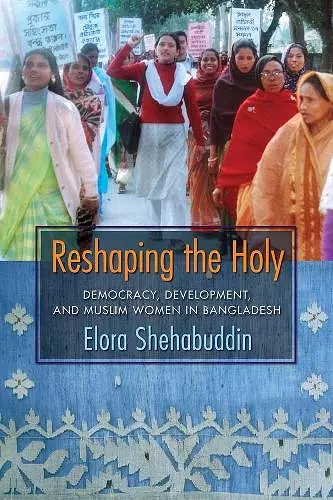Reshaping the Holy
Democracy, Development, and Muslim Women in Bangladesh
Format:Paperback
Publisher:Columbia University Press
Published:15th Aug '08
Currently unavailable, and unfortunately no date known when it will be back

Reshaping the Holy may well prove to be one of the works that leads the field of Middle East and Muslim women's studies out of the dilemma in which we feel we must pinpoint and categorize pious women who are also political. -- Sondra Hale, University of California, Los Angeles Rural, poor, landless, illiterate women--in Bangladesh, they are on the covers of aid agencies' and donors' brochures; they are pursued by well-meaning NGOs; they are the source of deep anxiety for emergent Islamicists; they present a tantilizing lode of votes for political parties. Here in rich detail, Elora Shehabuddin reveals how women at the very bottom rungs of the national and global ladders make their own calculations about spiritual purity, which party deserves their votes, and what strategies to craft to protect themselves when the weak state offers so little security. Every chapter of this important book is absorbing. -- Cynthia Enloe, Clark University, author of Globalization and Militarism: Feminists Make the Link Among the many accounts of religion and politics in South Asia, few foreground the experiences of impoverished rural women. Like scholars, political parties in Bangladesh have depicted religion and politics as deeply and inevitably polarized. By contrast, the major concern of poor rural women is the state's failure to provide essential social services. Their exercise of subaltern rationality, often fortified by NGOs, has forced political parties that seek their electoral support to take heed. Herein lie the hopes for the refashioning of Islamic politics in democratizing contexts. Reshaping the Holy is a welcome addition to the literature on gender and social change in South Asia. -- Amrita Basu, associate dean of faculty, Paino Professor of Political Science and Women's and Gender Studies, Amherst College Elora Shehabuddin offers us a wonderful window into the complex practices that engage poor rural Bangladeshi women caught between the demands of social sustenance, piety, and a disenfranchising state. Against a backdrop of textual readings of Islam, she invites readers into women's lives as they respond to and create ways to negotiate the diverse resources available to them, whether offered by secularist NGOs or the Jama'at-i-Islami. Drawing on ethnographic accounts that highlight the needs and implicit demands of poor rural women as agents of their own lives, Shehabuddin challenges opposing western modernity and religious doctrine to unpack how institutionalized politics recasts secular and religious parties alike as they seek to secure their rule. -- Shelley Feldman, director of feminist, gender, and sexuality studies, and professor of development sociology, Cornell University
Through extensive field research, Elora Shehabuddin explores the profound implications of women's political and social mobilization for reshaping Islam. Specifically, she examines the lives of Muslim women in Bangladesh who have become increasingly mobilized by the activities of predominantly secular NGOs, yet who desire to retain, reclaim, and reshape-rather than reject-their faith. In their employment and in their interactions with the legal system, the state, NGOs, and political and religious groups, women are changing state practices, views of women in the public sphere, and the nature of lived Islam itself. In contrast to most work on Islam and Muslims, which has focused on the Middle East and has privileged the study of religious and legal texts, this book redirects our attention to South Asia, home to one of the largest Muslim populations in the world, and emphasizes the actual experiences of Muslims. Women and gender, as well as Bangladesh's formally democratic context, are central to this inquiry and analysis.
Reshaping the Holy: Democracy, Development, and Muslim Women in Bangladesh is a welcome addition to what we know about Bangladesh, Islam, and development practices. Journal of Asian Studies
ISBN: 9780231141574
Dimensions: unknown
Weight: unknown
304 pages